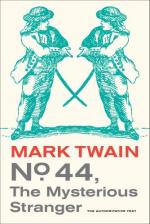|
This section contains 4,764 words (approx. 16 pages at 300 words per page) |

|
SOURCE: "Mark Twain's Dream Self in the Nightmare of History," in Mark Twain Journal 15, No. 1, Winter, 1970, pp. 6-12.
In the following essay, Johnson situates Twain 's philosophical stance within the duality of idealism and pragmatism.
There is, as F. O. Matthiesen and Stephen Whicher have remarked, in Emerson's developing metaphysics a double consciousness, an awareness that there are two ways of seeing the world, an ideal and a real, in terms of freedom and fate, or from the points of view of Reason and the understanding. Because nature is an extension of thought, because the act is manifest thought, man is as free as thought. But at the same time nature and man himself are fated by their own biology and chemistry. There is, then, existent at the same time, causationism that Emerson defines in his essay, "Power," as a determined and necessary relationship between event and thought...
|
This section contains 4,764 words (approx. 16 pages at 300 words per page) |

|


